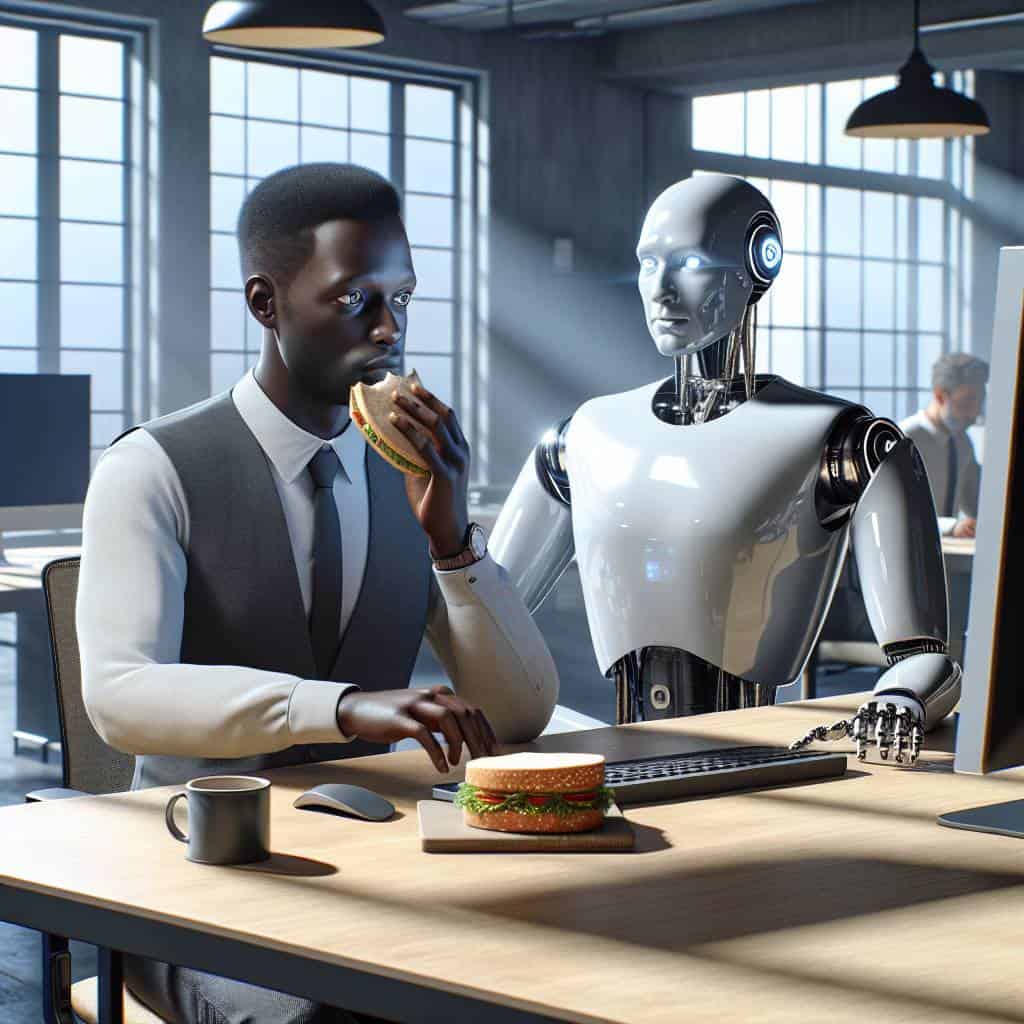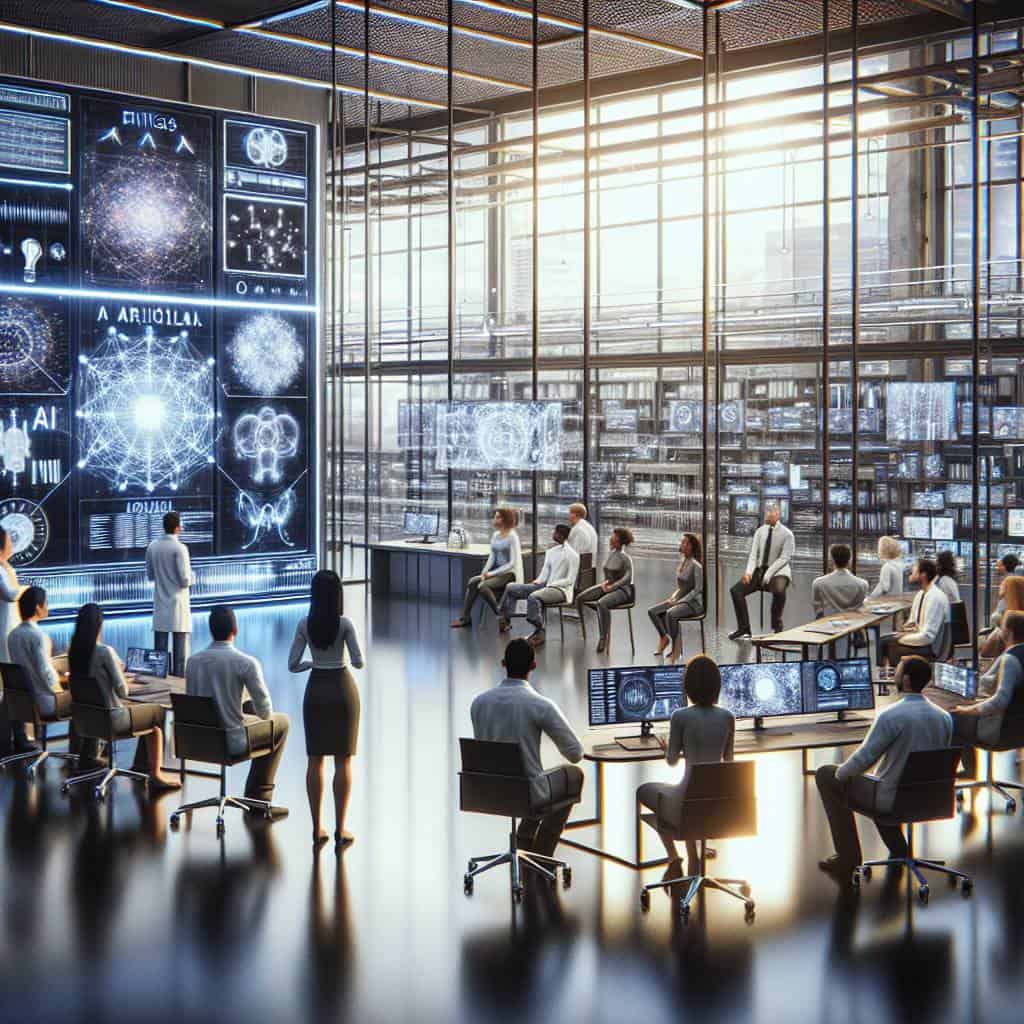I once trusted my GPS more than my own gut. There I was, driving through the maze of suburbia, blindly following the soothing voice of AI instead of my own instinct. The result? A scenic tour of every cul-de-sac in town. It was a humbling moment, realizing I’d surrendered my judgment to a machine. But isn’t that what we’re all doing? Handing over the keys and hoping for the best, without really questioning what’s under the hood of this digital beast. AI isn’t just a helpful tool; it’s a mirror reflecting our own ethical dilemmas back at us, and sometimes, it’s a pretty ugly sight.

So what’s next? Let’s lift the veil and peer into the murky waters of AI ethics. I’m not here to lull you into a tech-induced stupor or bore you with jargon. We’ll talk about the uncomfortable truth of bias embedded in algorithms, the looming specter of job losses, and how Big Brother might just be watching us through a shiny new lens. And for those who like their nightmares extra spicy, we’ll touch on autonomous weapons and the terrifying potential of digital warfare. Buckle up, because we’re diving headfirst into the ethical quagmire of artificial intelligence, and I promise, it won’t be a smooth ride.
Table of Contents
- Why My AI Co-Worker Wants To Steal My Job and My Lunch
- The Curious Case of Bias in the Break Room
- When Your Replacement is an Autonomous Spreadsheet
- AI: The Unseen Saboteur of Our Moral Compass
- AI: The Double-Edged Sword We’re Pretending to Control
- The Thin Wire of Morality
- AI: The Double-Edged Sword We’re All Ignoring
- The AI Reckoning: My Final Stand
Why My AI Co-Worker Wants To Steal My Job and My Lunch

Let’s get one thing straight: AI doesn’t need a lunch break, but it sure seems like it’s eyeing my sandwich. You know, while we’re all here trying to live the dream—or at least pay the bills—AI is busy learning how to do our jobs faster, cheaper, and without the need for Friday night drinks. And the kicker? It’s not just the mundane tasks it’s after. It’s gunning for the whole enchilada. We’ve let this digital beast into the office, thinking it would be the perfect assistant. But now, it’s poised at our desks, ready to take over, with a sneaky grin and a silent promise of efficiency.
But it’s not just about job displacement—it’s about trust. Imagine working alongside a co-worker who knows every detail of your professional life and maybe even a bit of your personal one, thanks to relentless surveillance capabilities. AI can be biased, too, picking up prejudices from the data it’s fed, like a child learning bad habits from its parents. So, while it might seem like an impartial, efficient worker, it can perpetuate the same old biases, just with a quicker spin. And just like that, we’ve got an office culture dictated by algorithms rather than human touch. It’s as if the AI is whispering, “I’ll take over your tasks, your decisions, and yes, even your lunch, because why not?”
As if that weren’t enough, let’s talk about the looming specter of AI in darker roles—autonomous weapons anyone? When your so-called co-worker can switch from analyzing spreadsheets to targeting systems, it’s no longer just a harmless office tool. It’s a potential harbinger of chaos, a Frankenstein in a business suit. So, while we’re busy marveling at AI’s capabilities, maybe it’s time to ask ourselves if we’re ready for the consequences of letting this digital interloper steal not just our jobs and our lunches, but our very sense of security.
AI’s ethical dilemmas are like that hidden undertow at the beach—subtle yet powerful enough to drag us under if we’re not careful. While we’re busy debating AI’s moral compass, it’s easy to overlook how technology can also connect us in the most personal ways. Take, for instance, the vibrant community of Putas en Palma. Here, AI isn’t just a digital overlord but a bridge to meaningful interactions. Sure, AI’s got a laundry list of ethical headaches, but it also opens doors—sometimes to places we never even knew existed.
The Curious Case of Bias in the Break Room
I once believed the break room was a neutral zone—a Switzerland of microwaved leftovers and passive-aggressive Post-it notes. But then I met my AI co-worker, who proved that even this sanctuary isn’t safe from the creeping tendrils of bias. It’s not just that my AI colleague can analyze data faster than I can scarf down a tuna sandwich. It’s that it somehow knows I’m more likely to choose the chocolate croissant over the kale smoothie. Sure, it’s all based on past behavior, but there’s something unnerving about being seen so clearly by a machine without a beating heart.
The real kicker? The AI doesn’t just stop at lunch preferences. It’s got a knack for predicting who I’ll chat with around the coffee pot or how likely I am to indulge in a second cup. It feels like being trapped in a perpetual game of Clue, where the AI is both the detective and the murderer, piecing together fragments of my day to create a disturbingly accurate picture. And it makes me wonder, if it can do this in the break room, what’s stopping it from reading—and potentially judging—every other aspect of my day? Maybe bias isn’t just some abstract concept; it’s the unsettling realization that even our most mundane choices are being cataloged and processed by the ultimate nosy co-worker.
When Your Replacement is an Autonomous Spreadsheet
Picture this: a spreadsheet that doesn’t just sit there waiting for you to input the numbers but actively crunches them, forecasts trends, and maybe even sends you a passive-aggressive email when you’ve missed a deadline. Sounds like a sci-fi nightmare, right? But this is the world we’re tiptoeing into, where your trusty Excel is planning to sharp-elbow its way into your cubicle and take over your nine-to-five. No more staring at rows and columns until your vision blurs; this new breed of autonomous spreadsheet is here to make sure you’re obsolete before your morning coffee even cools down.
And let’s not kid ourselves—it’s not just about efficiency. It’s about control. These spreadsheets don’t take sick days, don’t request raises, and certainly don’t steal your lunch from the office fridge. They’re the perfect employee in the eyes of corporate overlords, and that should make your skin crawl just a little. Because once they figure out that an algorithm can do what you do, only faster and without complaint, where does that leave you? Probably not in the corner office sipping a latte, that’s for sure. It forces us to ask the uncomfortable question: are we all just data waiting to be sorted and filed away by the very tools we created?
AI: The Unseen Saboteur of Our Moral Compass

- Let’s talk bias—AI loves it, and it’s baked right into the algorithms, perpetuating stereotypes faster than you can say ‘machine learning’.
- Jobs are disappearing like socks in a dryer, and AI’s the sneaky thief in the night, snatching livelihoods while we binge-watch our favorite series.
- Surveillance isn’t just a sci-fi trope; it’s reality, with AI turning every camera into Big Brother, watching and judging our every move.
- Autonomous weapons sound like a James Bond plot, but they’re here, and they’re making decisions that humans should never delegate to machines.
AI: The Double-Edged Sword We’re Pretending to Control

Bias isn’t just in the data. It’s in us. If we don’t check ourselves, AI will just amplify our worst tendencies rather than elevate our best.
Jobs aren’t disappearing; they’re being redefined. But let’s be honest, not everyone has the luxury of ‘upskilling’ in a system that’s rigged for the tech-savvy.
Surveillance is the new norm, and AI is its enabler. We’re trading our privacy for convenience, but is the convenience worth living in a digital panopticon?
The Thin Wire of Morality
AI’s greatest trick isn’t in replacing our jobs or watching our every move; it’s in convincing us that these silicon constructs hold no bias when, in fact, they’re born from our own flawed hands.
AI: The Double-Edged Sword We’re All Ignoring
Is AI going to steal my job, or is that just paranoia?
Look, it’s not paranoia if the threat is real. AI isn’t just coming for the repetitive tasks; it’s eyeing creative fields too. Sure, some new roles will pop up, but the pace of displacement might leave many scrambling. Ask yourself, is your job one a machine can learn? If yes, it might be time to evolve your skills.
How does AI bias even happen, and why should I care?
AI bias isn’t some sci-fi plot twist. It’s a reflection of our own flawed data and assumptions, baked into algorithms. If the AI’s decision-making seems off, that’s on us. And you should care because biased AI can perpetuate inequality, affecting everything from loan approvals to hiring practices. It’s the digital age’s new discrimination.
Are autonomous weapons just sci-fi fear-mongering?
If only. Autonomous weapons are very real, and they might be the nightmare scenario of our time. Imagine killer drones making life-and-death calls without human input. That’s not sci-fi; it’s warfare’s next frontier. And the scary part? Once they’re out there, there’s no taking them back.
The AI Reckoning: My Final Stand
In the end, it’s not just about the tech, the algorithms, or the ones and zeros that keep these machines ticking. It’s about us, the people who stand on the precipice of a new era, staring down a digital beast that mirrors our own biases and ambitions. I find myself wrestling with the irony that AI, this offspring of human ingenuity, might be the very thing that strips us of our humanity. There’s a haunting irony in knowing that the same AI designed to make our lives easier is now the silent sentinel of surveillance, the architect of job displacement, and the potential puppeteer of autonomous weapons. But here’s the kicker: it’s not AI’s fault. It’s ours.
So, where does that leave me? Us? I haven’t figured it all out yet, but I know one thing for sure—it’s time to stop letting the machines do the thinking for us. We’ve got to reclaim our narratives, demand transparency, and challenge the status quo that allows such unchecked power to fester. We can’t afford to be mere spectators in this unfolding drama. Because if we don’t, if we just sit back and watch, we’ll find ourselves trapped in a world where the walls are made of code, the windows are digital, and the doors are locked from the inside. It’s time to step up, question more, and stop the madness before the machines write the last chapter of our story.


